
|
"If It's Going Good, You Keep Your Mouth Shut"
The Abel Ferrara Interview
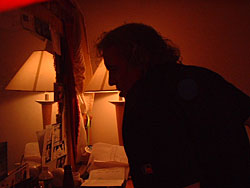 Abel Ferrara
Abel Ferrara |
August 19, 2002 | A few weeks ago
Cinema Gotham took a look at filmmaker Abel Ferrara's latest film, 'R Xmas. (link) The film, which currently has no domestic distribution deal, can only
be seen at the occasional film festival, like the Village Voice's Best Undistributed
Film series. American audiences will eventually get the chance to check
out this exciting, unique, personal film. ("Don't worry," Ferrara assured us.
"The film will come out.") But for Ferrara's loyal following, the wait is excruciating.
Beginning with
his first feature film, 1979's Driller Killer, Ferrara has crafted a
dark, downtown world filled with drugs and violence. His second feature, 1981's
Ms. 45 added a sense of moral outrage and Ferrara's personal brand of
redemption with its rape victim-turned-vengeance killer. He continued making
films throughout the 1980's but a turning point came with 1990's King of
New York. That film, which gave Christopher Walken one of his most memorable
roles, was Ferrara's most complete film to date in terms of fully exploring a character. In the film, Walken played Frank White, an ambitious drug dealer who returns
from prison and quickly takes over the entire New York underworld.
Ferrara's follow-up
to King of New York, 1992's Bad Lieutenant, took his growing concentration
on character even further. Harvey Keitel's unnamed cop was as corrupt as White
was crafty. Once again the character seeks redemption of a painful and complex
variety. Ferrara's films over the next decade covered a lot of ground, from
the big budget Body Snatchers (1993), to the histrionic Snake Eyes
(also 1993, renamed Dangerous Game) starring Madonna, to the quiet, soulful
The Funeral (1996). Ferrara has cultivated an air of adventure and an
eagerness to take risks. The New York Times once said he's like "a Martin Scorsese
who had chosen to make nothing but B movies." While films like Bad Lieutenant
may be shocking, they're hardly B movies. Still, there is an unhinged sense
of danger, even when there is little onscreen violence.
'R
Xmas fits perfectly into Ferrara's oeuvre. Streamlined to an extreme (the
film is literally half the length of many of today's bloated productions), 'R
Xmas sketches out a pair of characters, played by the outstanding Drea de Matteo and Lillo
Brancato (both of HBO's The Sopranos), who lead a double life: part-time Upper East Side-living BMW-driving
parents, part-time mid-level drug dealers. When Brancato's character is kidnapped
by a crew led by Ice-T they're forced to rethink their place in the food chain.
Unlike A Christmas Carol, however (from which 'R Xmas draws inspiration)
there is no clear path and the film leaves the audience without an obvious moral
wrap-up. And unlike most drug dealer movies, Ferrara's characters are more interested in hunting down an elusive (and hilariously slutty) Party Girl doll for their daughter than in collecting
on
a debt.
Cinema Gotham
recently spent an extremely hot evening at Ferrara's apartment on the edge of the West Village talking with the filmmaker and his producing partner and production
designer Frank DeCurtis, about the film, the state of filmmaking, and the
drug underworld of New York City.
|
| |
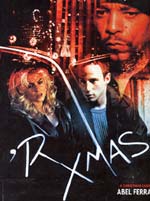 The 'R Xmas poster
The 'R Xmas poster |
Cinema Gotham:
You've said that the film was partially inspired by this woman's real life story.
(The pseudonymous Cassandra DeJesus, who's credited with the story for the film and is a
somewhat mysterious figure.) Where did it come from?
Abel Ferrara:
I started thinking about it four or five years after King of New York
and it was funny how King became – here's a film that was a bomb when
it was released, know what I mean? It was booed at the New York Film Festival.
Then it became this kind of cult thing and I was thinking, "Well, what's the
other side of King of New York?" I was really looking for a film about
the drug business that wasn't 50 gallon drums and you take over all the Columbians
in two days and then three days to take over the Italians – that was King of New
York. I wanted to make a film that was what was the reality of the business.
You get a bag of something and you're looking at it saying, "Who tied this up?
Who decided whether to charge this or that? How did a real Frank White really
operate?" And this girl, we bumped into her and she was really one person in
many. I mean, the story of a drug dealer getting kidnapped, you talk about boy-meets-girl,
that makes boy-meets-girl look like the most original concept in history. Drug-dealer-gets-kidnapped.
Thank you.
Frank DeCurtis:
You haven't been kidnapped, you ain't a drug dealer.
AF: Yeah,
it's not even a joke how fucking lame that is. Okay, but anyway, the point is
the whole world that she was part of and that we started to get into. I wanted
to do the documentary side of King of New York, in a way. I also at that
time had the idea to do a feature in digital video, which had just started.
So it was trying to come up with an idea that we could shoot digitally. You
know, something simple like that. In the end it wasn't simple, it was a complicated
film being in a period and all that.
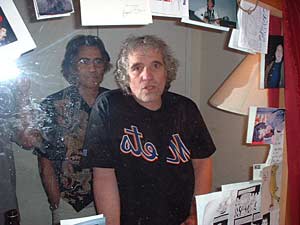 DeCurtis and Ferrara
DeCurtis and Ferrara |
FD: We were
also talking about being specific about that grey area
of some of Abel's anti-heroes. I'm not talking about reinventing morality but
people do what they do for a living. Forty years ago bookmaking was illegal,
now there's OTB [Off-Track Betting]. So it was a vice crime forty years ago, it's not today. There's
an executive running it and there are clerks at OTB now. They love their families,
their families love them, and they share their holidays
together. When you [consider] the prohibition
of different vices over the years because of the government, it doesn't make
these people so bad.
AF: Yeah,
to them, in this city, I mean in Washington Heights and other places the drug
business is the only business. When you talk about legalizing the drug business, that would be the final blow to the fucking
ghetto, in a sense. That would take out the only real means... It's a horrible
thing to say but it's like when they tell him [Brancato's character in 'R Xmas], "We see you out
in the street again you're dead," and his wife is telling him, "Whoa, my kid's
staying in school and we're not giving up the BMW." What's this guy gonna do?
That's why we had it "to be continued" because we couldn't stop while he went
to TV fix-it school.
CG: It's an
impossible scenario. The ending definitely challenges the audience because you
gotta put all those pieces back together yourself.
FD: We
don't. The people in the film do.
CG: The audience
does too.
FD: The
audience has the pleasure of dealing with that. Plus, finding holes in Abel's
story. But no matter how much they try we defy them ...
CG: The scenes
where they're putting the drugs in the packets is an angle where most filmmakers
wouldn't even take the time to show all the detail.
FD: That's the thing. Is it rocket
science? No, it's not rocket science. But you risk your life, your freedom and
your security while you're doing it. Because you can get arrested, you can get
broken into and killed, kidnapped a lot of things can happen and that's why
some people are risking a lot of time by doing it, so these people, their whole
thing is about secrecy.
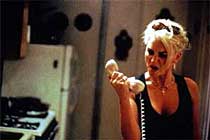 Drea de Matteo
Drea de Matteo |
CG: But it's
also a risk of screen time.
AF:
I thought about that constantly.
CG: But there's
a payoff, too. You get to know characters while they're doing the procedural
stuff, getting dressed...
FD: Our
characters' clothing was an essential plot point because what they have to do
is they have pass mustard in their upscale building and have the same exact
clothes also be a passport into their faux apartment that's actually their workhouse.
It's called casually elegant but in some kind of way they have to have easy
movement. So it's a very, very important point.
CG: You build
the film out of these details: clothing , cars...
AF: That all came from
the research pictures and also talking with her [DeJesus]. She wanted credit
for what she didn't do, she didn't get credit for what she did do. In other
words, we used her because we accepted the truth of the story whether it was
or not. And once she realized the movie was gonna be made she started changing
her tune eighty different ways. All of a sudden her character, she might as
well change in a telephone booth with an "S" on her chest. We researched to
the Nth degree. That world that it was about, the streets where they were dealing
with all that stuff.
FD: We
plotted out these people's lives on paper. If you're bagging however many thousands
of bags they had every single day to supply the people they had to supply, that
doesn't leave too much free time. So that activity never went out of their lives.
That's an activity that they actually did every single day for 10 or 11 hours
a day.
AF: Yeah,
16 hours a day. Business kept getting better. They couldn't just bring anybody
in.
FD: Maybe
we should have shown that more because that's all those people did. All day
and all night. And if a holiday was coming up they had to bag more time so instead
of 15 hours a day they had to bag 18 hours a day to make up for the three or four hours
they might want to spend with their family.
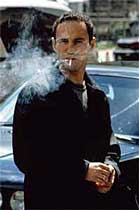 Lillo Brancato
Lillo Brancato |
CG: And you
show Brancato's character picking up a package of heroin from a priest in a
church. Everyone's implicated.
AF: The
thing that gave us the break was that Christmas was Christmas. People accept
that this isn't really the routine. The question was "Are we nailing the Catholic
Church?" Now, they told us they used the church that day. They didn't use the
church all the time but by us using the church that day it made it seem like
that was the connection. [They also used a] bakery, a shoe store. But by representing
it that way, that's a heavy statement you're making, that the source of the
stuff was the church. But we would go with that because we always made the decision
to go with their memory. Like if she said the Ice-T character wore work boots
then he wore work boots, not high top sneakers. You'd be surprised how her memory locked in.
The small things she wouldn't obviously change and those were the things we
were after anyway. With the big things, we didn't care.
CG: Did you
get to a point where you said "maybe the big things aren't even true and I don't
care because it's taken on its own life and gone in it's own directions?"
AF: Yeah,
absolutely.
FD: This was like
an organization of secrecy. That's why we got such a kick out of the big-deal locking system
on the next door neighbor's closet. It was a nail. I mean, that's how casual
it was.
AF: Who
would have gone up there?
FD: Because he wasn't jeopardizing
her or anything. It was just like business as usual. We didn't get into people
OD'ing and, "It's the greatest product in the world." That's par for the course,
everybody knows that stuff. [Our] movie was about buying a doll. That's all
those people cared about. The dope business, that they did every single day.
They don't give a shit about the dope.
They're worried about how they're gonna get this doll. They never talk about the
strength of the dope or anything like that, the victims that become junkies...
![[Our] movie was about buying a doll.](https://www.dvdtalk.com/cinemagotham/archives/Rxmas5.jpg) "[Our]
movie was about buying a doll."
"[Our]
movie was about buying a doll." |
CG: The system
works already. It's up and running. If a guy works at the bank he doesn't walk
in every day thinking, "Wow, there sure is a lot of money in here."
AF: Yeah.
It's a well-oiled machine.
FD: The
ugly side, the nightmare side of the family thing, is they think they can also
trust their family as much as they care about them. So they think that sending
money away to his mother to build the house with the swimming pool to retire
to in Santo Domingo, they think that that's sacrosanct. Well, it ain't.
So when they're on the phone, we don't even have to do that in English. In any
language it comes out to the same thing: "There's no money down here. You're
fucked."
CG: Yeah, you
don't even need subtitles.
FD: It's
really about family relations. I was real tempted to lean on Abel, "Come on,
how about we have some junkies nodding out." He's like, "Forget that, Frankie.
It's about the family. About buying the doll for the kid."
AF: Yeah,
because they never even thought about it. In reality, she never did drugs. She
was totally dead-set against it until they started making the money. It's funny
how that point got made. Just by saying "David Dinkins" everybody accepted an
open and free drug market. [After] Guiliani] it didn't exist. It was over. Bang.
You can't find one. There's not those people walking up the street, lining the
street. We didn't even do it the way they had it. They had fucking lines down
the block. Now
you go to those same neighborhoods at night and they have a big searchlight.
Not that any less drugs are being sold. That's the real trip.
CG: How did
you like working with this cast?
AF: I love
them. We were gonna go with [John] Leguizamo and Annabella Sciorra. We had
so much time to rehearse that we rehearsed right through one cast and went to
another one. We had put this film together and were about to make a whole different
film. We were gonna make a film with those two in the leads and real people
in all the other parts and we ended up going with complete actors. Well, there
was a real cop in those cop scenes. There's a few choice non-actors.
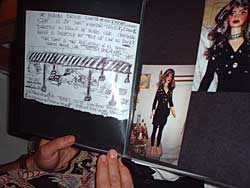 DeCurtis' book of designs for the film
DeCurtis' book of designs for the film |
FD: But
it's still unnerving that it almost looks like you don't know what you're watching.
I mean, unless you're really familiar with Lillo. Not that we wanted to cast
people because they might look obscure or totally changing the look or anything
but still the actors at the time that they did the film... Okay, great The
Sopranos, this and that, but...
AF: These
aren't household people.
FD: Right.
You don't have to make believe that, "Hey, I know Tom Cruise is an actor but
I like watching him act and I know it's make believe." This one you could at
least look at it like "What am I watching? Am I watching a documentary with
camera set-ups? What the hell am I watching?" And there's enough of it in there
to shake you up a little bit. Obviously it's not documentary-style but it's
as close to a fly-on-the-wall of a place where you never get to be with terrific
performances by actors that are very real.
CG: I've read in
a couple interviews that you sort of allow the material to develop in a way,
not that you're not involved, but that it's not micromanaged.
AF: I'm
there, so I'm involved.
CG: But it's
not this sort of Quentin Tarantino, micromanaged style where everything needs
to look exactly a certain way and be posed a certain way.
AF: Yeah,
but I bet he didn't direct Harvey like that. In other words it could be micromanaged
but he didn't direct Harvey like that. Or Walken or that English kid [Tim Roth].
You know what I'm saying? Or probably that other guy that cut the guy's ear
off [Michael Madsen]. If it's going good, you keep your mouth shut. You know, if it's not happening
you're all over everybody.
CG: It's an anal retentive, "I'm gonna storyboard every shot just like Hitchcock" sort of thing.
AF: If it's
happening, I keep my mouth shut. I'm smart enough not to say anything. If it's
not happening, we do every thing we can do. We go back to square one.
FD: We
micromanage the reality of it. The sets, how you're shooting, the lenses. So, on that level you're
so involved it's not funny. But if you have an actor that you're trying to elicit
a creative character-developing performance from, what are you gonna do? Tell
the guy what his natural instincts are? You know, you tell him, "Take two steps, stop, turn around take
two steps, go back." But if the guy takes three steps and he's not gonna be
in the light, you gotta warn him about it. "Dude, you're doing perfect but if
you take three steps your not gonna get in the movie." So you're micromanaging
to the extent that you're trying to make what they're doing look the best and
be the best.
AF: We've
cut the shooting process down in half. We rehearse a lot. We rehearse as much
as we shoot. Because the thing
is with most films you see the financiers are not crazy about paying actors
unless the camera's turning. So most of these films that are 60 day shoots,
they're rehearsing 20 of the 60 . With the crew sitting around getting paid
and getting bored and getting antsy. So a lot of the work we do and a lot of
the work Frank and I do we just don't do it on the set. It's like, I don't usually
walk on the set and now I'm seeing everything for the first time.
FD: There's
not too many people sitting around. Maybe on big money projects you might meet
huddled together somewhere...
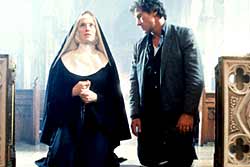 Bad Lieutenant
Bad Lieutenant |
AF: Because
of that they don't really have a chance really to rehearse, so if the thing
ain't happening they just shoot it. They don't rehearse on those pictures because
they're working with actors that are getting paid too much to rehearse.
FD: That's
why you get these actors that you know are gonna deliver the goods. Like, the English guy, Hugh Grant. You know he's gonna deliver his charming,
witty performance. That's what you're paying for. Whether
you rehearse for a thousand years, he's gonna deliver those goods. If you get somebody who's looking to find his character, like Benecio
[Del Toro]...
AF: Benecio wanted a month, two months [to prepare] back at that time [1996's The Funeral].
Walken rehearses, forget it. He'll exhaust you. I mean,
they got it all down. Keitel is the same way. But like he says, as much as it
might be needed you just can't afford to keep a crew, especially on a big money movie. It's funny. I see movies that are a $100 million. First of all, I see scenes I know were like redos, but they're takes.
On top of that, you're watching them shooting one day and three weeks later
it's out in 2-3000 theaters. You're watching unrehearsed material.
CG: What's
going on with the film now?
AF: When we finished making the film they [StudioCanal, the French film production company] took out a full-page ad in the back of Variety
thanking us. And they had made a film with Jarmusch and a film with Waters and a film with Lynch and I'm thinking we're in like Flynn. From that moment on,
that company has gone into total turmoil. [StudioCanal's parent company, Vivendi Universal, came close to bankrupcy.] There's no company. There's nobody
there. You can't get anybody on the phone. They're being sold. There's nothing
to say. It's comedic at this point. You talk about being in a Kafka-esque
nightmare. Except as long as we finished the film I'm satisfied. If it happens,
great. We've been moved on [to the next project] the day we finished shooting
the film. It's playing everywhere else in the world. It opened in Europe. It
was in the Cannes Film Festival. In Europe it was like
a regular film. it opened, played, and is going to DVD.
 King of New York
King of New York |
CG: Would you
be happy if it just went to DVD here?
AF: No,
I wouldn't be happy if it didn't have some kind of release. If you go straight
to DVD no one knows it's there. There has to be some kind of domestic distribution.
FD: [Films
are always] shown on a big screen with the knowledge that eventually films go
to a new life on TV and rentals. You know that going in. But nevertheless, the
art form is the theater, big screen, people sitting in the dark watching a movie
larger than life. So it's a different approach if you're gonna make a film that's
never to be shown in that format. This film was composed to be shown in a theater and then in
a secondary back-pocket mental-note you know it's going to be shown [at home].
AF: But
there's no DVD life if it doesn't come out theatrically.
CG: Have you
done any work personally for DVD release?
AF: We
did the first half hour [of audio commentary for New Rose Hotel]. I thought
we did tremendous. Me and him [Frank] were doing a double barrel. I said, if
you get us a DAT taperecorder [we can do it ourselves.] We were going to this
super-expensive sound studio where they can run the movie. I said forget about
it, just get us a DAT player. For $500 we can sit and watch the movie. Anyway,
they got it in their heads that we were gonna steal the DAT player. "Whatever
is gonna happen, you are not gonna get a DAT taperecorder!" So we did the first
half-hour and it was fantastic. And we come out of the booth thinking it was
great. We come back they say "Okay, go
back in the booth, we're gonna turn the tape on now." I go, "Turn the tape on?"
Then they start with "We had a technical problem." Oh, so you let us go for
a half-hour? They had no interest with doing the next thirty minutes and then
they start trying to direct us because they realize they're getting the same
thirty minutes again. So he's sitting there watching the movie going "Wow, that's
great," and I'm sitting there singing the songs with the movie. And that was
the end of that. We never heard from those people ever again. They were saying,
"Do you know how much money you wasted in that studio?" I said, "Well, why didn't
you get me a DAT recorder?"
|
|
|
Talks continue to start and stop on the future of 'R Xmas. StudioCanal is currently negotiating with Paul Cohen (the distributor of Bad Lieutenant) for a domestic release. (StudioCanal and Vivendi Universal's luck may be improving as well. Just today (8/19/02) they announced new financing. (link)) In the
meantime, Ferrara is busy plotting his next project, The Last Crew, a prequel to King of New York. Still haunted by Frank White, Ferrara plans to explore his character's early years.
UPDATE: 'R Xmas will be released on DVD on November 19th. (Click here for the 'R Xmas DVD at Amazon.com.) It will also be released in select New York and Los Angeles theaters on November 22nd.
|
Archives
Columns
|
| New Review: |

|
|

